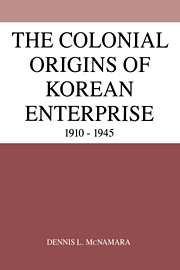Summary
Min Tae-sik, Pak Hung-sik, and Kim Yŏn-su confronted the awesome task of being both Korean and successful within the colonial economy. They took up the challenge with their own blend of ideology, enterprise, and portfolio management in the shadow of a strong colonial state and extensive zaibatsu investment on the peninsula. Sustained ownership and management of core ventures represented a legacy of both structure and precedent for postcolonial capitalism in Korea. And if patterns of concentration, state relations, and class ties among a Korean inner circle distinguish dependent capitalism in large-scale enterprise through 1945, intriguing questions of causes, continuity, and concepts remain. I conclude with possible causal factors behind these patterns, continuities in the postcolonial economy, and the theoretical significance of the colonial experience of large-scale enterprise.
Attention to portfolios with interrelated levels of investment puts the issue of concentration in a different light than is evident in case studies of simply the major enterprise of one or another native entrepreneur. Ownership and control characterized the first two concentric levels of investment, directorships and smaller blocks of shares distinguished the outer two levels. The Mins, Pak, and Kim concentrated capital in core ventures of the first two levels, balancing their portfolios with more diversified holdings on the third and fourth levels.
- Type
- Chapter
- Information
- The Colonial Origins of Korean Enterprise1910–1945, pp. 122 - 138Publisher: Cambridge University PressPrint publication year: 1990



